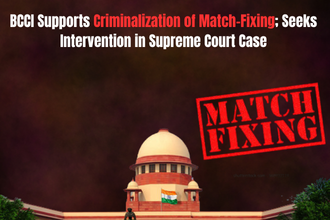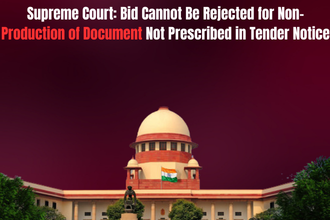In a major development that could redefine the legal framework around sports integrity in India, the Board of Control for Cricket in India (BCCI) has voiced strong support for the criminalization of match-fixing, describing it as a serious offense deserving penal consequences. The BCCI has also sought permission to intervene in an ongoing case before the Supreme Court of India, which is currently examining the scope of betting and match-fixing under existing criminal laws.
BCCI’s Intervention Before the Supreme Court
A Bench comprising Justices Surya Kant and Joymalya Bagchi was apprised of the BCCI’s stance by Advocate Shivam Singh, who serves as Amicus Curiae in the matter. Singh informed the Court that the cricket board has filed an intervention application formally supporting the criminalization of match-fixing and clarifying that the act already falls within the ambit of cheating under the Indian Penal Code (IPC) — now replaced by the Bharatiya Nyaya Sanhita (BNS).
The BCCI’s submission argues that match-fixing meets all the legal ingredients of cheating, as defined under Sections 415 and 417 of the IPC (corresponding to Sections 318 and 320 of the BNS, 2023). According to the Board, the act involves fraudulent inducement, deception, and dishonest intention, which cause harm to the interests of spectators, sponsors, and stakeholders who invest in the sport in good faith.
“The act of match-fixing clearly constitutes an offense of cheating, as it attracts all the ingredients of deception, fraudulent or dishonest inducement, and intentional acts causing damage or harm,” the BCCI’s application states.
The Legal Foundation – Cheating and Match-Fixing
Under Section 415 IPC, cheating occurs when a person deceives another and dishonestly induces them to deliver property or do something they would not otherwise do, causing harm. Section 417 IPC prescribes punishment for cheating, while Section 420 IPC applies to cases where the deception results in the delivery of property or valuable consideration.
The BCCI contends that spectators spend money to watch matches in stadiums and fan parks, while sponsors and investors commit substantial sums to teams, leagues, and merchandise. Therefore, when a player intentionally manipulates a match outcome, they deceive all stakeholders, amounting to a breach of trust and financial loss, which satisfies the elements of Section 420 IPC (Cheating and Dishonestly Inducing Delivery of Property).
Law Commission’s Recommendation
The BCCI also invoked the 276th Report of the Law Commission of India (2018), which had emphatically recommended that sports fraud and match-fixing be recognized as distinct criminal offenses. The Commission had observed that the absence of a specific statute penalizing match-fixing leaves a gap in the legal system, weakening the fight against corruption in sports.
The Law Commission had proposed that sports fraud be punished with imprisonment of up to five years and heavy fines, given its ability to damage public faith in competitive sports and erode the spirit of fair play.
Background: The Karnataka Premier League Case
The issue of match-fixing reached the courts following a high-profile case in Karnataka Premier League (KPL) 2019. The Karnataka Police filed a chargesheet under Section 420 IPC against cricketers CM Gautam and Abrar Kazi, both accused of accepting ₹20 lakh from bookies to deliberately underperform in the tournament’s final match. Allegedly, their actions led to the defeat of their team and benefited the opposing side, Hubli Tigers, who won by eight runs.
However, the Karnataka High Court later quashed the proceedings, ruling that match-fixing did not meet the essential elements of cheating under Section 420 IPC. The Court reasoned that while such conduct was unethical and violated the BCCI’s code of conduct, it did not involve “delivery of property”, a key requirement for prosecution under Section 420.
“It is true that if a player indulges in match-fixing, a general feeling will arise that he has cheated the lovers of the game. But this general feeling does not give rise to an offense under criminal law,” the High Court held.
The Court added that the BCCI, as the governing body, was empowered to take disciplinary action under its bylaws but that criminal proceedings under IPC provisions were not sustainable.
Supreme Court Appeal
Challenging this decision, the State of Karnataka has approached the Supreme Court in the matter titled State of Karnataka and Anr. vs. Abrar Kazi and Ors., SLP (Crl) Nos. 9408–9411/2022. The apex court’s eventual ruling is expected to determine whether match-fixing can constitute a criminal offense within the framework of existing penal laws or if new legislation is needed.
The BCCI’s intervention in this case is viewed as a landmark move, signaling a shift in the sporting body’s approach from purely disciplinary control to advocating legal accountability.
Broader Implications for Sports Governance
The BCCI’s support for criminalization aligns with global trends where sports fraud is treated as a serious crime. For instance, in countries like Australia, the United Kingdom, and South Africa, match-fixing is specifically criminalized, and offenders face substantial jail terms.
In India, while the Prevention of Corruption Act and Public Gambling Act deal with betting and bribery in certain contexts, no specific legislation targets match-fixing in private sports leagues. The BCCI’s intervention may thus catalyze the enactment of a dedicated “Sports Integrity Law”.
Why Criminalization Matters
Match-fixing undermines public confidence in the fairness of sports, discourages legitimate investment, and threatens the credibility of India’s massive cricket ecosystem, which contributes significantly to the national economy.
Criminalization would not only serve as a deterrent against corruption in sports but also provide law enforcement agencies with the necessary legal framework to investigate and prosecute offenders. This move could also pave the way for international cooperation in tackling transnational betting syndicates that operate across borders.
Conclusion
The BCCI’s proactive stance before the Supreme Court underscores its recognition that disciplinary measures alone are insufficient to curb corruption in sports. By supporting the *criminalization of match-fixing, India’s premier cricket body aligns itself with the global consensus that integrity in sports must be protected by law.
As the Supreme Court considers the Karnataka government’s appeal, its verdict could lay the foundation for a new era of sports jurisprudence in India—one that balances the autonomy of sports bodies with the need for criminal accountability in cases of corruption and fraud.
The outcome of State of Karnataka v. Abrar Kazi may well decide whether match-fixing remains a disciplinary violation or becomes a criminal offense punishable by law—a decision that will have far-reaching implications for Indian cricket and the broader sporting community.
Also Read
Supreme Court Refuses to Intervene in Telangana HC Order Staying OBC Quota Hike in Local Bodies



